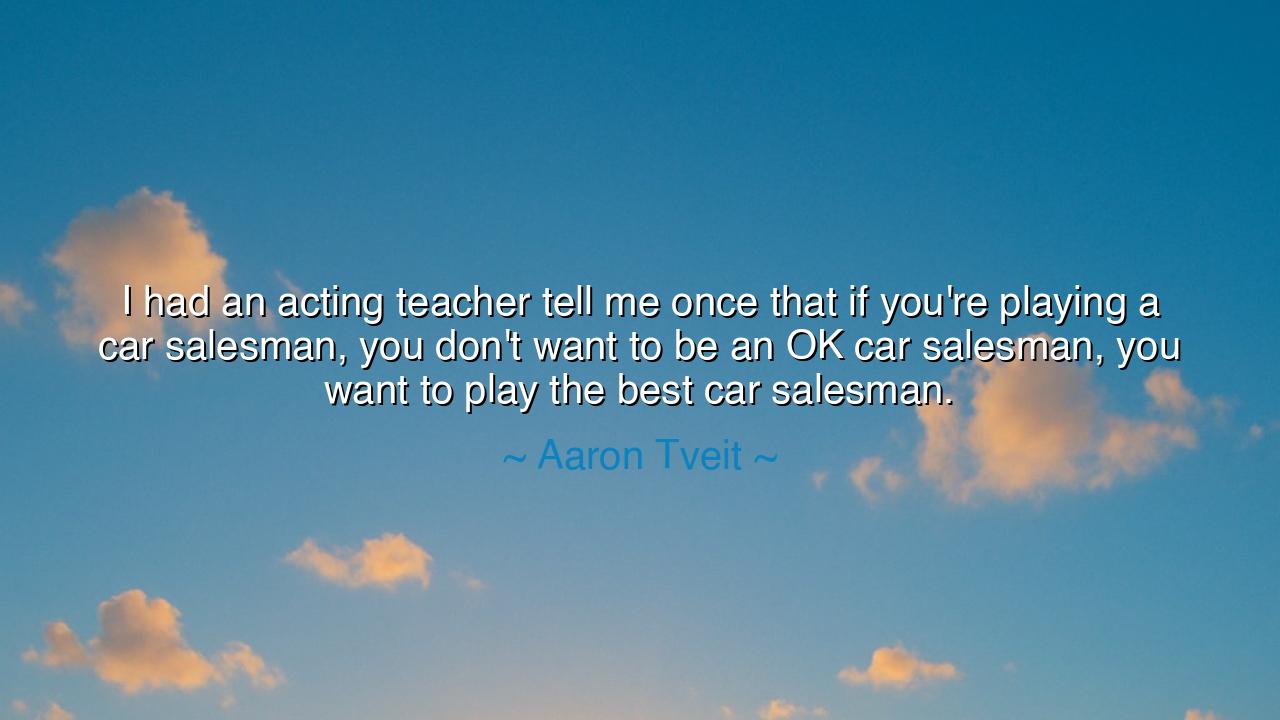
I had an acting teacher tell me once that if you're playing a
I had an acting teacher tell me once that if you're playing a car salesman, you don't want to be an OK car salesman, you want to play the best car salesman.






Aaron Tveit, the actor and singer, once recalled the wisdom of his mentor: “I had an acting teacher tell me once that if you’re playing a car salesman, you don’t want to be an OK car salesman, you want to play the best car salesman.” Though spoken of the stage, this teaching carries the force of a life-principle, one that transcends the theater and enters the heart of every calling. It is a reminder that mediocrity is a betrayal of both self and art, and that in whatever role one is given—whether mighty or small—one must strive to embody it with fullness, with fire, with truth.
The origin of this wisdom is found in the craft of acting, where the stage demands more than half-measures. A role, however humble, becomes alive only when pursued with total conviction. To portray a mere “OK” car salesman is to offer the shadow of life, but to inhabit the best car salesman—vivid, persuasive, filled with zeal—is to reveal the richness hidden in the ordinary. Tveit’s teacher was not speaking only of roles, but of existence itself: that life, like the stage, rewards those who give themselves wholly, who do not shrink back into the safety of “good enough.”
This truth has echoed through the centuries. Recall the tale of Alexander the Great and his tutor, Aristotle. Alexander, even as a youth, was taught that he should not merely rule as other kings, but strive to be the best among them. To lead not as a caretaker of lands but as a conqueror of worlds. He embraced this teaching with such fervor that he expanded his empire beyond the imagination of his forefathers. Though history may debate his methods, his conviction to embody greatness in his role is undeniable. He did not settle for “OK”—he strove for the summit.
The teaching speaks not only to kings and actors but to all who labor in the world. The farmer who tills the soil may be tempted to say, “It is enough that my crop survives.” Yet the one who labors with care, who strives to bring forth the richest harvest, transforms not only his field but the community it sustains. The mother who teaches her child may think, “It is enough that my child learns,” but when she teaches with patience, vision, and love, she raises not only a student, but a soul prepared to meet the world. In every role, greatness is possible—not in comparison with others, but in the fullness of one’s own effort.
The emotional power of Tveit’s quote lies in its refusal to accept the dullness of mediocrity. For to be “OK” is to waste the breath of life. But to strive for the “best”—to pour spirit and intensity even into the smallest task—is to turn even the common into the noble. Imagine the stage: a role as small as a street vendor can become unforgettable if played with life and conviction. So too in our days: even the smallest duties, when done with excellence, become immortal.
What then shall we learn? First, that every role assigned to us is sacred, whether we are cast as leader or servant, teacher or student, actor or audience. Second, that the measure of greatness is not the size of the part, but the depth of devotion we bring to it. Third, that striving to be the “best” version of our role awakens a spirit of excellence that inspires others and enriches the whole of society.
Practically, this means: do not approach your work with half a heart. If you sweep streets, sweep them with care until they shine. If you write, write with the fullness of your voice. If you play, play with joy as though the world were watching. And if you are given a small role—whether in a play, a workplace, or in life itself—pour into it as though it were the crown of destiny. For in truth, the greatness of life is built upon the greatness of small acts done with fullness.
Thus, the wisdom of Aaron Tveit’s teacher resounds like an ancient oracle: never settle for being “OK.” Whatever part is yours, live it as the best. For the stage of life is short, and the curtain falls swiftly. Let it be said, when the lights dim, that you played your role with excellence, and gave to the world not a shadow, but a shining flame.






AAdministratorAdministrator
Welcome, honored guests. Please leave a comment, we will respond soon